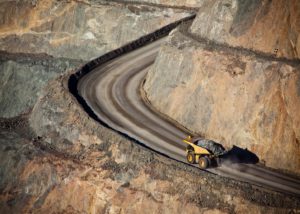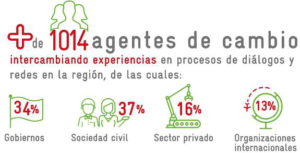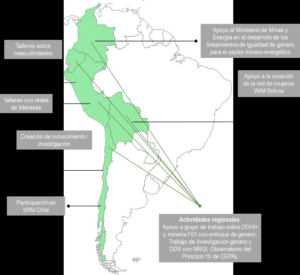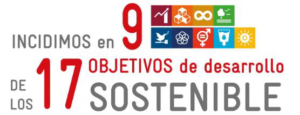Introduction and context
Latin America and the Caribbean are abundant with natural resources and biodiversity. The extractive industries have been a lever for growth in the Andean countries, contributing considerably to their economic development. However, an inadequate management and governance of mining has negatively impacted on the environment and has been a cause behind the existence of socio-environmental conflicts and human rights violations.

Despite the importance of mining in the region, the work that women undertake in the sector remains invisible due to the traditional gender roles they fulfil. Women have lower employment rates than men in a highly masculine sector, caused by diverse cultural and structural barriers. Together with the lack of visibility of women in the sector, the negative impacts of mining fall disproportionately on them, who suffer also diverse types of violence(s) that impact on their physical, economical and decision-making autonomy.
In this context, the Regional Cooperation for the sustainable development of mining resources in the Andean countries Programme implemented by the Deutsche Gesellschaft für Internationale Zusammenarbeit (GIZ) and the German Federal Institute for Geosciences and Natural Resources (BGR) commissioned by the German Federal Ministry for Economic Cooperation and Development (BMZ), aims at promoting and implementing international standards as well as the Sustainable Development Goals (SDG), applying alternative solutions and lessons learned exchanges from the sector’s regional counterparts. With the support of the Programme’s regional counterpart, the United Nations Economic Commission for Latin America and the Caribbean (ECLAC), the Programme follows, as a central element, a multi-stakeholder approach and focuses on gender equality as part of its central objectives, in a cross-sectoral way, understanding that mining is not a gender-blind activity.
Corporate culture
• Capacity building
Internal capacity building in the Programme has been a key pillar in promoting gender equality in the mining sector. In this regard, several consultancies have been developed on the linkages between mining, gender and the SDGs and have developed also a gender mainstreaming and human rights strategy for the Programme, with a greater focus on the third phase. The strategy aims to contribute on capacity building and tools development internally in the Programme, rendering visible the different challenges that persist in regards to gender equality, knowledge generation and dissemination on mining and gender, generating strategic alliances at a regional and global scale, the continuation and strengthening the multi-stakeholder approach that articulates the Programme on all its axis, and the development of capacity building with the regional counterpart, ECLAC, and internally within the MinSus team. In this regard, the strategy emphasises on the next steps linked to strengthening synergies with the Programme’s counterpart, ECLAC; on emphasising the interdependency between human rights, the environment and sustainable development to maximise positive impacts of the Programme; and focusing on incorporating a cross-sectoral gender perspective on mining supply chains.
• Knowledge generation and management
In its six years of work, the Programme has generated knowledge at the individual and institutional scale and in the networks where it participates in on the topic of gender equality and human rights. In this regard, it has been a priority to emphasise on the management of knowledge, specifically as the Programme moves from one phase to another and with the aim of making best and efficient use of all that has been developed. This has been done mainly through the Programme’s website (www.minsus.net), producing videos and infographics, participating in GIZ’s gender competitions in previous years and generating news on the events developed in order to make more visible the topic, amongst others. Also, the development of multiple high-level dialogues and workshops has allowed experience and best practices exchange and rendering visible documents and knowledge generated within the framework of the Programme, both on behalf of GIZ and its counterparts.
• Focus on processes
As part of the human rights-based approach and GIZ’s corporate culture, the focus on processes, both internal and external, have been key in the Programme. In this sense, the Programme’s cycle includes a gender perspective from the development of the initial diagnoses, the budget assignment, implementation, evaluation and knowledge and learning management. Likewise, Capacity Works tools have been developed from a gender perspective including stakeholder mappings, that allow yo make visible the different mining stakeholders (women organizations, gender equality programmes, amongst others), annual operation plans and the results based monitoring (which has gender disaggregated data for every event that has taken part and the compilation of surveys that allow to correctly manage learning with the aim of improving, and allows producing the data represented in the above diagram). Externally, the Programme has contributed to the support and development of participatory processes within the framework of the activities with the Ibero-American Federation of Ombudsman (FIO) on human rights and gender equality in mining contexts. All documents, dialogues and releases developed within the framework of this group have been developed in participatory and consensus building processes within a multi-stakeholder arrangement with the technical contributions of the Ombudsman Institutions themselves, GIZ, FIO and ECLAC as well as other United Nations entities.
Gender competence
In the Andean region, the role of women in the mining sector varies greatly depending on the country. For example, women in Chile work mainly in the formal sector, while in other countries in the region such as Bolivia and Peru, women are more highly represented in the informal mining sector, where they have less protection regarding precariousness and violence, highly impacting on their autonomy.
Women in mining identify mainly as miners (labour force); decision makers (both in the public and private spaces); environmental activists both in favour and against mining; and environmental and human rights defenders. One of the documents developed within the framework of the Programme (Stefanovic and Saavedra, 20161) together with ECLAC revealed the multiple critical nodes that exist in the region regarding women’s incorporation in the mining sector. Among them it is relevant to highlight the cultural barriers associated with traditional gender roles, existing human resources policies in mining enterprises, organizational practices, operational conditions of the sector, maternity as an access barrier, labour regulations and lack of differentiated infrastructure.
With the aim of contributing to gender equality, several tools have been used and adapted from the United Nations framework and other international institutions that specialize on the topic, such as gender mainstreaming; the gender empowerment approach; combining the issues of human rights and gender equality; and, the focusing on women’s autonomies (economic, decision-making and physical).
Successful approaches:
• The Programme has taken into account in the implementation a differential approach in view of the great heterogeneity of gender equality and women’s rights by country.
The strategies implemented by the Programme have been moulded to the needs of the stakeholders in the different Andean contexts. In the Peruvian context, were an important part of mining takes place in rural contexts with a long history of socio-environmental conflicts and human rights violations, were community leaders play a key role in negotiations, dialogues and agreements with mining enterprises, it is imperative to promote women leaders’ role in these communities. Therefore, the Programme has supported the Centro Ideas and the Mining Dialogue and Sustainable Development Group (GDMDS by its Spanish acronym), in the development of workshops focused on promoting community women leader’s empowerment and the transformation of current toxic masculinities through dialogue processes and conflict transformation approaches. On the other hand, in Bolivia due to the detected lack of women mining networks, the Programme supported the creation of the Women in Mining Bolivia network enhancing the generation of a space for women geologists, miners and other professions related to the field.
• Gender mainstreaming has been another successful approach implemented, becoming a pillar of the Programme and all of its activities, outputs and impacts.
Gender mainstreaming in the Programme has meant including a gender perspective in all topics, activities, workshops, events and research, in a cross-cutting way. Regarding the implementation of the Programme, gender mainstreaming in the sectorial ministries has been particularly targeted. This is the case of the technical assistance provided to the Colombian Ministry of Mines and Energy aiding in the development of their gender equality policy for the mining and energy sector, which aims to mainstream gender in the sector through promoting gender equality in labour, eliminating all forms of violence related to the sector and minimizing the sector’s negative impacts on communities, amongst other key policy guidelines.
• Since the Programme identified a greater resistance to gender equality in the mining sector as opposed to human rights, the Programme has aimed at combining both approaches in its implementation.
Combining these approaches has meant an opportunity to position gender equality within the human rights-based approach framework. This combined approach has been the pillar of the work carried out on the topic of incorporating a human rights-based and gender equality approach in the environmental impact assessments in mining contexts with ten Ombudsman Institutions in the region as part of the work carried out in the Ibero-American Ombudsmen Federation (FIO) working group on human rights and enterprises together with ECLAC and occasional support of the Danish Human Rights Institute.
Cooperation
Cooperation and the multi-stakeholder focus have been two key approaches in the Programme’s implementation. With the presence of governments, civil society, academia and private sector representatives, the aim has been to enrich dialogues, workshops and events alongside experience exchange and the generation of strategic alliances. In this sense, relevant alliances with women organizations in the mining sector has been developed, specifically with Women in Mining International, Bolivia and Chile, as well as with global and regional organizations that incorporate gender equality as a key aspect of their work such as the Natural Resources Governance Institute (NRGI) and the Ibero-American Ombudsman Federation (FIO).
• 3 successful factors:
o Generating multi-stakeholder dialogues, events and workshops has been a key pillar in the Programme’s implementation.
The development of multiple high-level dialogues has allowed generating a space with the highest governmental authorities, civil society representatives, academia, multi-stakeholder initiatives and relevant enterprises allowing to position topics and innovative perspectives regarding gender equality and human rights in the mining sector. Moreover, efforts have been made to incorporate a larger number of women in these spaces, with the aim of promoting and enhancing their voice in order to render visible their needs and differentiated challenges, aiming at conforming equalitarian panels in these events, which remains a challenge due to the higher number of men in the sector.
o Cooperation with the United Nations – ECLAC.
The close cooperation with an entity of the United Nations such as ECLAC, with extensive experience as a regional think tank positioning issues and influencing public policy, has been very important to the Programme. For example, the undertaking of a technical assistance to the Ministry of Mines and Energy of Colombia in the development of their gender policy for their mining and energy sector together with ECLAC has been relevant to enhance synergies and make the most of their framework of action regarding gender equality. Moreover, the first phase of the Programme worked closely with the ECLAC’s Gender Affairs Division, which, regarding its experience on the matter, produced a document on gender and mining in Chile and led many workshops and dialogue roundtables on the topic together with the Mining Ministry of Chile promoting the development of a Decalogue on Mining and Gender.
o Using the 2030 Agenda as a common framework and language amongst countries and stakeholders.
The 17 SDGs of the 2030 Agenda for Sustainable Development, and its spirit of “leaving no one behind” have been used as common language to address problem areas linked with gender in mining with the different implementing counterparts and partners. Two essential linkages have been addressed which relate to the importance of the two-dimensionality that characterise the relevant issues surrounding mining and gender. The first, is the linkage between decent work and gender equality (SDG 5 and 8), which reflects how economic development must be gender inclusive in order to provide a sustainable employment that promotes gender equality. And, secondly, the linkage between gender and the environment (SDG 5, 6 and 13) that reflects how most of local populations at a global scale depend upon natural resources. Access to natural resources is a key factor for these populations, including ensuring an equitable distribution and sustainable use of extractive resources. Due to their traditional role as care-takers, providing food for their families and communities often falls disproportionately on women, it is essential to guarantee access to water, sanitation and energy. In this line the Programme has made efforts to present these essential linkages between mining and SDGs through work like the one undertaken in the following website: https://odsamericalatina.redextractivas.org/, developed together with the Latin American Extractives Industries Network (RLIE by its acronym in Spanish), amongst other initiatives.

 GIZ Gender Website
GIZ Gender Website


